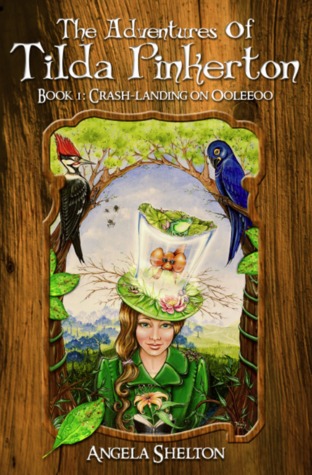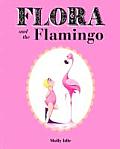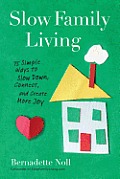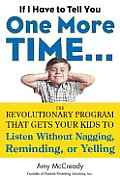 Yesterday, I featured a review of Slow Family Living: 75 Simple Ways to Slow Down, Connect, and Create More Joy by Bernadette Noll. Today, Bernadette is stopping by Mother Daughter Book Club. com to talk about the Slow Family Movement, her book, and what families can do to bring more joy into their lives.
Yesterday, I featured a review of Slow Family Living: 75 Simple Ways to Slow Down, Connect, and Create More Joy by Bernadette Noll. Today, Bernadette is stopping by Mother Daughter Book Club. com to talk about the Slow Family Movement, her book, and what families can do to bring more joy into their lives.
What inspired you to create SlowFamilyLiving.com?
BN: I was working with Carrie Contey giving a workshop on Creating a Family Mission Statement. The resounding theme was that people were feeling overwhelmed by external pressures from society/media/friends/family to do things a certain way, to sign up, enlist, and jump on board even when they didn’t really want to. We joked that like Slow Food there needed to be Slow Family which would allow people to connect to the process and find joy in the day to day. That afternoon we wrote the manifesto and Slow Family Living was born!
What do you think presents the biggest challenge to families being able to slow down?
BN: Perhaps the biggest challenge is that we are constantly getting messages delivered to us that make us live in fear that if we don’t sign up, jump on, enlist NOW we, and our children, are at risk of being left behind. Marketers spend billions making us feel that way. The media works hard to tell us that we are not doing enough to stay safe, stay smart, stay well. In my book I really focus on offering ideas and inspiration to help families pause and tune into self so that they can figure out what they really and truly want for themselves and for their family.
Why do you think it’s important for families to spend less time on the go and have more down time together?
BN: I think in our modern day society we tend to give family time the last available time slot. I really think families can find great joy and connection in each other, great strength too, and I think the way to find that is to give family time priority and make sure that it holds a rightful place in our schedules. It’s not so much about having more down time, although for us as a family that is the goal, it is about finding the time to create connection now, while you’re all under one roof, so that down the road, when everyone is grown, you can have that connection in place. If you think of parenting as a 12” ruler, we really only get about ¼” with our children in our homes. The rest of the time they are out on their own. So what kind of connection do you want with these people with whom you will be adults for 40, 50 years? I really don’t want to add more pressure to do things a certain way, rather I wrote this book hoping to give parents ideas and permission even to do things their own way.
How do you see moms and dads using your book to simplify their lives?
BN: I offer lots of ideas for people to find ways to slow down, connect and really and truly see each other. My goal is that people use it not as a prescription but as a book of recipes which they can use, mix up a bit, and add in the ingredients in their own families and homes. I have things in the book that offer real practical ideas and other things that are more about a feeling. I grew up in a super connected family and lots of these ideas come from that experience. I think sometimes as parents we think parenting has to be cranky or joyless, when we live it in joy it is just that much more fun. So I offer ways to find joy in the day to day and to still get sh*t done!
When you decided to slow things down, was it difficult getting buy in from your husband and your kids?
BN: It wasn’t really a new idea in our home because it’s what I always wanted for my own family. I came from this idea that you could live family life with intention and with celebration. Randomly my family resists something I bring to the table – and I have to be willing to take their desires and needs into consideration!
In your own family, with four children and two busy parents, do you find you have to keep reminding yourself to reassess the commitments that make life busy?
Absolutely! And in fact, this is one of the main points I hope people take away from this book – the idea that on a regular basis you pause, check in with yourself and with the members of the family and ask, “Is what we’re doing really working for us?” And we use the moods in the house as a barometer for how it’s going. When we’re all cranky with each other we know it’s time to reign it in a bit!
So many families seem to be overscheduled and stressed out from it, yet there’s often a lot of pressure from other parents, teachers, team coaches and others to sign up for activities and events that take a big chunk of time. Do you have any advice on how to resist that pressure?
BN: This exact question is one of the main reasons we started Slow Family and why I wrote this book. My book and my website offer lots of tools for dealing with this pressure. The slow in Slow Family is about pausing and checking in with yourself and asking, “What do WE want?” Then looking down the road a few years and figuring out what your goals are. I also have a Family Mission Statement workbook on my site that helps families really tune into what they want, what they value, and how they want to feel in this whole lovely life.
How do you deal with the feeling of “missing out” that may come from turning down activities?
BN: We really don’t miss out on much that we really want to do. That was an interesting realization too because we thought that would be an issue. Instead we found great relief in the fact that we are assessing each thing and figuring out if we really, really want to attend. In the beginning my husband thought it might upset others when I said, “we’re gonna take it slow this weekend.” But really, I think people were relieved to know that that was a valid excuse to use. And then they used it too!
The subtitle of your book suggests that slowing down can help create more joy in a family. What do you mean by “joy” and how do you see that happening?
BN: There is so much to do in family life and we have a choice about how we approach it. We can moan about how much work we have to do or we can find ways to inject a little fun and to do things together. Not only do we ease our load but we can find connection and joy in the process. Our Family Blitz is a prime example of this. The house gets messy as any parent well knows. Rather than me feeling cranky, we can call BLITZ! Set the timer for 15, 20 minutes and it’s all hands on deck for a quick tidy. It’s easier and when things are easier there is just inherently more joy. When we are less stressed and less overwhelmed, joy is a natural by-product.
Do you have anything else you’d like to say to readers at Mother Daughter Book Club.com?
BN: There is no guilt over “doing it wrong” – rather there is understanding that if it feels wrong, whatever it is, we can tweak it to make it work for us. As individuals and as a family. And trust too that YOU KNOW BEST what your family needs and wants. And how you feel can be the supreme guide!
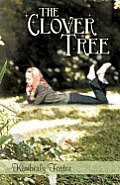 Occasionally I accept guest reviews, and I recently received several from moms talking about a book for teens called The Clover Tree by Kimberly Foster. I’m featuring those reviews, along with an offer by Foster to give away 5 autographed copies of The Clover Tree to readers at Mother Daughter Book Club. com. Here’s the synopsis of the book from publisher Balboa Press, followed by the reviews.
Occasionally I accept guest reviews, and I recently received several from moms talking about a book for teens called The Clover Tree by Kimberly Foster. I’m featuring those reviews, along with an offer by Foster to give away 5 autographed copies of The Clover Tree to readers at Mother Daughter Book Club. com. Here’s the synopsis of the book from publisher Balboa Press, followed by the reviews. 
